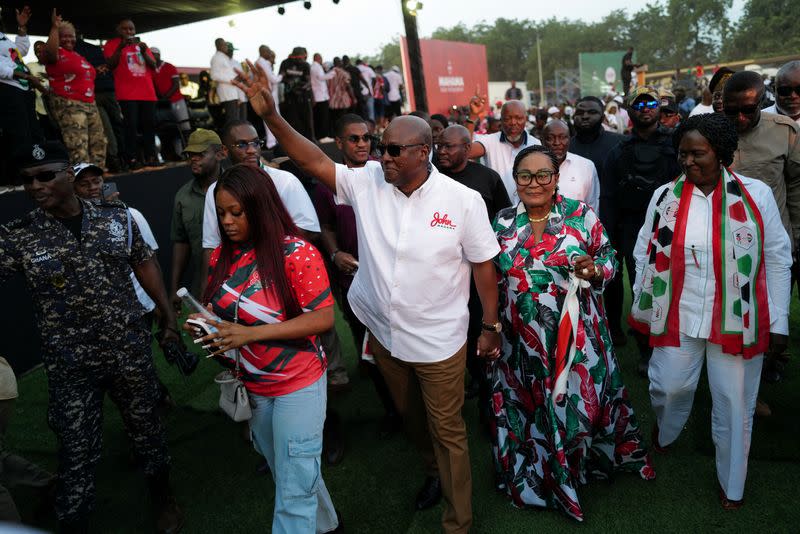Ghana's VP and former president among 13 candidates for presidency
ACCRA (Reuters) -Ghana's electoral commission on Friday published a list of 13 candidates approved to run in the presidential election, which analysts say will be a two-man race between Vice President Mahamudu Bawumia and former president John Dramani Mahama.
Voters in the West African gold- and cocoa-producing nation head to the polls on Dec. 7 to elect a successor to President Nana Akufo-Addo, who will step down in January after serving the constitutionally mandated eight years.
Former president Mahama, 65, represents the main opposition National Democratic Congress (NDC) party and Bawumia, a 60-year-old economist and former central banker, was picked by Akufo-Addo's ruling New Patriotic Party as its candidate.
The commission said it had also accepted the candidacies of Alan John Kwadwo Kyerematen, a former trade and industry minister who resigned from the ruling party to stand as an independent, Nana Kwame Bediako, a businessman competing for the first time for the top job, and Nana Akosua Frimpomaa, one of two women in the race.
Mussa Dankwah from Accra-based research group Global InfoAnalytics said the list of qualified candidates was the longest in Ghana's history.
"It just opens up the space but in practice, the votes are going to be among four candidates: Bawumia, Mahama, Kyerematen and Bediako. The rest, I don’t expect them to get more than one percent," Dankwah told Reuters.
Some candidates from northern Ghana, including Bernard Mornah from an opposition party and Janet Nablah, an independent candidate, did not appear on the list.
Bright Simons, an analyst at Accra-based think tank IMANI, said that meant Bawumia's and Mahama's parties would be battling for "the soul of the North".
On Tuesday, Mahama's NDC party held nationwide protests saying the electoral commission had illegally transferred voters to different voting stations without their knowledge.
The electoral commission said it would review a petition submitted by the party at the end of the demonstrations and provide a response in the coming days. It has previously said identified errors have been corrected.
The allegations add to growing public distrust in the electoral authority.
A July survey by pan-African research group Afrobarometer showed trust in Ghana's electoral commission at an historic low since confidence polls started in 1999.
(Reporting by Christian Akorlie and Maxwell Akalaare Adombila; Writing by Anait Miridzhanian;Editing by Ros Russell and Barbara Lewis)

